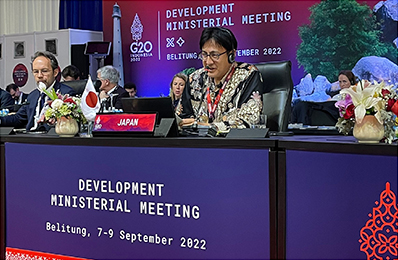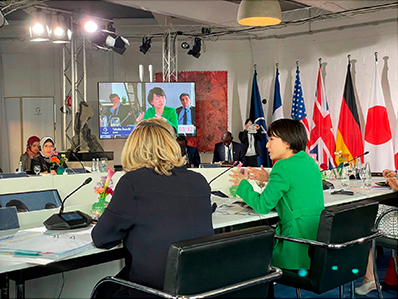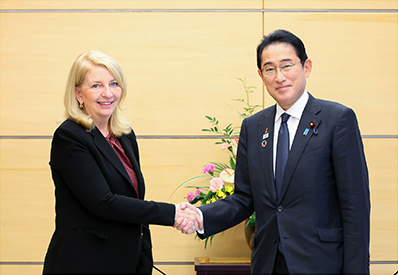(6) Partnership with Other Countries and International Organizations
A. Partnership for the G7 and G20 Development Issues

State Minister for Foreign Affairs Takei giving a speech at the G20 Development Ministerial Meeting held in Belitung, Indonesia (September 2022)

Then State Minister for Foreign Affairs Suzuki giving a speech at the G7 Development Ministers’ Meeting (May 2022)
In May 2022, the G7 Development Ministers’ Meeting was held in Berlin, and various issues in the areas of development were discussed. From Japan, then State Minister for Foreign Affairs Suzuki attended. The G7 reconfirmed that the international community will cooperate in providing support standing in solidarity with the people of Ukraine and its neighboring countries. In addition, the Ministers discussed promoting quality infrastructure investment and addressing development finance issues, promoting effective and just energy transitions while respecting the ownership of each developing country, and promoting gender equality and women’s empowerment. Then State Minister Suzuki introduced Japan’s assistance, including its food assistance to Africa, and reaffirmed its support for quality growth focusing on Africa’s potential. She also expressed Japan’s determination to work toward development led by Africa itself during TICAD 8, which was to be held in August.
Then State Minister Suzuki also attended the Joint Working Session of the G7 Development and Health Ministers with then State Minister of Health, Labour and Welfare Sato. At the Session, the Ministers discussed facilitating equitable and sustainable access to vaccines, therapeutics, and diagnostics in developing countries and strengthening pandemic prevention, preparedness, and response in developing countries. Japan pledged up to 100 million US dollars in assistance, primarily to the Indo-Pacific region, to support the three pillars consisting of a vaccination data system, border control management with infection control measures in place, and infectious waste disposal in developing countries.
Prime Minister Kishida attended the G7 Elmau Summit in June 2022. In the Summit, international economic issues, including challenges regarding development finance and the infrastructure financing gap, were discussed. Prime Minister Kishida stated that the debt issues of developing countries have become increasingly serious, and the G7 must come up with effective solutions to these issues. He also emphasized that it is important to enhance the implementation of the “G20 Principles for Quality Infrastructure Investment,” which contain transparency, openness, economic efficiency in view of life-cycle cost, and debt sustainability, which all creditor nations must adhere to, and called on the attendees to further deepen the discussions. As a result of the discussions, the G7 agreed to aim to narrow the global infrastructure financing gap by mobilizing 600 billion US dollars in the coming five years through the “Partnership for Global Infrastructure and Investment.” The leaders also reaffirmed that the G7 will increase global food and nutrition security in response to the global food crisis brought about by Russia’s aggression against Ukraine and, to that end, provide an additional 4.5 billion US dollars.
As for the G20, the G20 Development Ministerial Meeting was held in Belitung, Indonesia, in September 2022, and State Minister for Foreign Affairs Takei attended. He condemned Russia’s aggression against Ukraine and spoke about topics such as the implementation of the “G20 Principles for Quality Infrastructure Investment,” ensuring the transparency and fairness of development finance, and the importance of adhering to international rules and standards. He also talked separately with the attendees of each G20 Member and reaffirmed collaboration with them in the field of development.
As for the G20 Bali Summit in October, Prime Minister Kishida attended from Japan. He strongly condemned Russia’s aggression against Ukraine and stated that Russia’s nuclear threat as well as its use were absolutely unacceptable. He also stated Japan’s intention to further strengthen emergency assistance, including food assistance, to countries in Asia, Africa, the Middle East, and others that are seriously affected by soaring food and energy prices. In addition, Prime Minister Kishida introduced that Japan has provided comprehensive assistance on a scale totaling 5 billion US dollars for efforts in response to COVID-19 in developing countries and others, based on the concept of multilateralism. He also emphasized that we should not stop responding to the COVID-19 pandemic since it is not over yet. The G20 Bali Leaders’ Declaration, which was issued at the end of the discussions, acknowledged the need for inclusive and quality infrastructure investment for stronger recovery and resilience and underscored the need to address the financing gap toward implementation of the 2030 Agenda, through enhancing innovative financing mechanisms while noting the importance of transparency and mutual accountability.
B. Dialogue with Major Donors
Japan holds dialogues with major donors to exchange views on priority issues and policies. In February 2022, a bilateral dialogue on development policy at the Director-General level between Japan and Germany was held, where both countries confirmed their close coordination in view of the G7 Presidencies, Germany in 2022 and Japan in 2023. They also exchanged views on the development cooperation policies of Japan and Germany, infrastructure development in developing countries, and global challenges, including measures to address climate change and responses to COVID-19.
In July, then State Minister for Foreign Affairs Suzuki held a video conference with Minister of International Development of Canada Sajjan. Both sides exchanged views on cooperation in the international arena, including close cooperation among the G7 for issues such as assistance for Ukraine and food security. In addition, they shared views to accelerate the concrete cooperation of the “Shared Japan-Canada Priorities Contributing to a Free and Open Indo-Pacific” announced in the Japan-Canada Foreign Ministers’ Meeting in May 2021.
In addition to the members of the Development Assistance Committee (DAC) of the Organisation for Economic Co-operation and Development (OECD) that are traditional actors in development cooperation, emerging countries such as China, India, Indonesia, Saudi Arabia, Turkey, Brazil, and South Africa, have become more proactive in providing assistance to developing countries in recent years. Through such assistance, these emerging countries have come to gain considerable influence over development issues. By cooperating with other countries, including emerging countries, Japan provides assistance to emerging countries (triangular cooperation) that helps enhance the effectiveness of the assistance extended from emerging countries to developing countries (South-South cooperation) (see “Project Introduction Column” for the cases of South-South cooperation (triangular cooperation)).
With regard to Japan-China relations, the Second Japan-China International Development Cooperation Policy Consultation was held in June 2021. Both countries exchanged views on various development issues and foreign aid from China.
The “Global Partnership for Effective Development Co-operation (GPEDC)” is a multi-stakeholder platform for driving the effectiveness and efficiency of development cooperation, bringing together not only donor countries but also a wide range of stakeholders, including developing countries, international organizations, private sectors, civil society, and local public entities for discussions. In December 2022, the Third High-Level Meeting of GPEDC was held, and the importance of its four effectiveness principles: Country Ownership, Focus on Results, Inclusive Partnerships, Transparency and Mutual Accountability, was reaffirmed.
C. Partnership with International Organizations

Prime Minister Kishida receiving a courtesy call from Executive Director Russel of UNICEF (November 2022) (Photo: Cabinet Public Relations Office)
Japan promotes collaboration with international organizations to address various developmental and humanitarian issues. In May 2022, Prime Minister Kishida had a telephone talk with Director-General Tedros of the World Health Organization (WHO). In July, Executive Director Beasley of the UN World Food Programme (WFP) and Administrator Steiner of the United Nations Development Programme (UNDP) respectively visited Japan and paid a courtesy call on Prime Minister Kishida. Then, in November, Prime Minister Kishida received a courtesy call from Executive Director Russel of the United Nations Children’s Fund (UNICEF) during her visit to Japan. Foreign Minister Hayashi held a meeting with Executive Director Sands of the Global Fund, who visited Japan in April, with Commissioner General Lazzarini of the United Nations Relief and Works Agency for Palestine Refugees in the Near East (UNRWA), who visited Japan in October, and with United Nations High Commissioner for Refugees Grandi, who visited Japan in November. In addition, in March, then State Minister for Foreign Affairs Suzuki held a meeting with Chief Executive Officer Berkley of Gavi, the Vaccine Alliance, who was visiting Japan.
In addition, in order to facilitate assistance through partnerships with international organizations, Japan also holds dialogues with UN agencies and major international organizations. In 2022, Japan held regular policy dialogues with UNICEF, the International Organization for Migration (IOM), WFP, and others (see “Stories from the Field 7” for Japanese personnel who work at UNFPA, and Japanese Personnel at International Organizations Playing Active Roles on the Front Lines across the World for Japanese personnel who work at international organizations).
